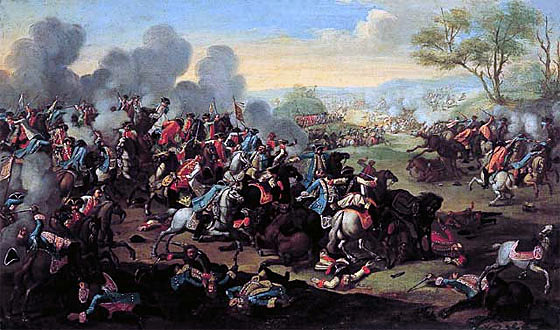18.6. 1757 Battle of Cologne
Categories: Years of war and revolution , Calendar

During the Battle of Cologne in June 1757 over twenty thousand soldiers were killed or wounded. It was therefore one of the largest conflicts of the Seven Years' War. The Prussians had to leave Bohemia after their defeat.
After the Battle of Sterbohol, Frederick was pleased to discover that most of the defeated Austrians had not escaped to the Czech countryside but had been trapped in Prague. He assumed that there were few supplies in the city and that it would not take long to starve Prague. He therefore ordered the chariotry and cannons to be brought from Litomerice for the siege. While Frederick waited for them to arrive by the Elbe, news of the defeat reached the Viennese court.
Field Marshal Daun, who had been appointed commander of the Austrian forces in eastern Bohemia just two days before the battle on 4 May, was now ordered to rally the soldiers who had fled the battle and release Prague from his grip. "Chancellor Kounic in Vienna immediately sent a message to Prince Karl in Prague to stay in the city and wait for Daun, who would come to the aid of the indecisive The prince was now the sole commander, for Browne had suffered a severe wound, to which he later succumbed," writes Simon Millar in Cologne 1757: Frederick the Great's First Defeat.
Frederick, meanwhile, informed of the Austrian plan to release Prague from his grip, ordered Beverne to hold the Austrians, led by Daun, in check. Bevern left the Prussian encampment on 10 May with 18,000 men. One of his first tasks was to get rid of the Croats, who were heading up the Elbe to Brandys, and then to push the Austrian forces back on the Imperial road. But the situation was not going well for the Prussian army, and after the Battle of Kolin on 18 June 1757 it was obvious that the Prussians were no longer able to hold on to Bohemia.
In fact, a larger Austrian army of 51,000 soldiers was victorious over a Prussian army of 33,500 under Frederick II. It was the first defeat of the Prussians in their campaign through Bohemia, during which they had already besieged Prague. "Field Marshal Leopold Daun commanded the last fighting Austrian army, reinforced by Saxon cavalry regiments. In the event of defeat, the Prussians would have opened the way towards Vienna," write Milan and Roman Plch in their book Where to go for military monuments.
The battle began with the Prussian occupation of Plaňany in the morning, followed by a clash with the Austrian retreat and a regrouping of forces. The Prussian army took Křečhor by storm, but when their pressure eased in the evening, Daun ordered the cavalry to retreat, succeeding in breaking the Prussian lines and forcing the enemy to retreat. "Frederick, aware of the battle already lost, left the battlefield without handing over command, yet thanks to a brilliantthe greater part of his army managed to retreat," the Plchs still describe the events of that time.
Daun, however, did not give chase and was content with victory. This had far-reaching consequences; the Prussians were forced to retreat from Bohemia. Judging by the number of dead and wounded - 9,000 on the Austrian side and 14,000 on the Prussian side - it was one of the biggest battles of the Seven Years' War.
Sources.
The article is included in categories: